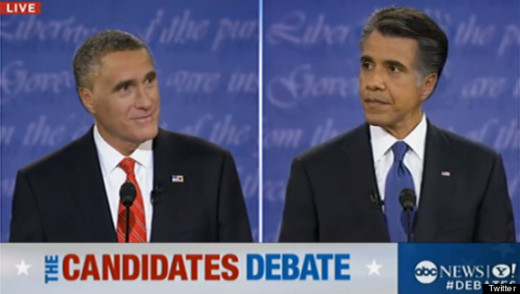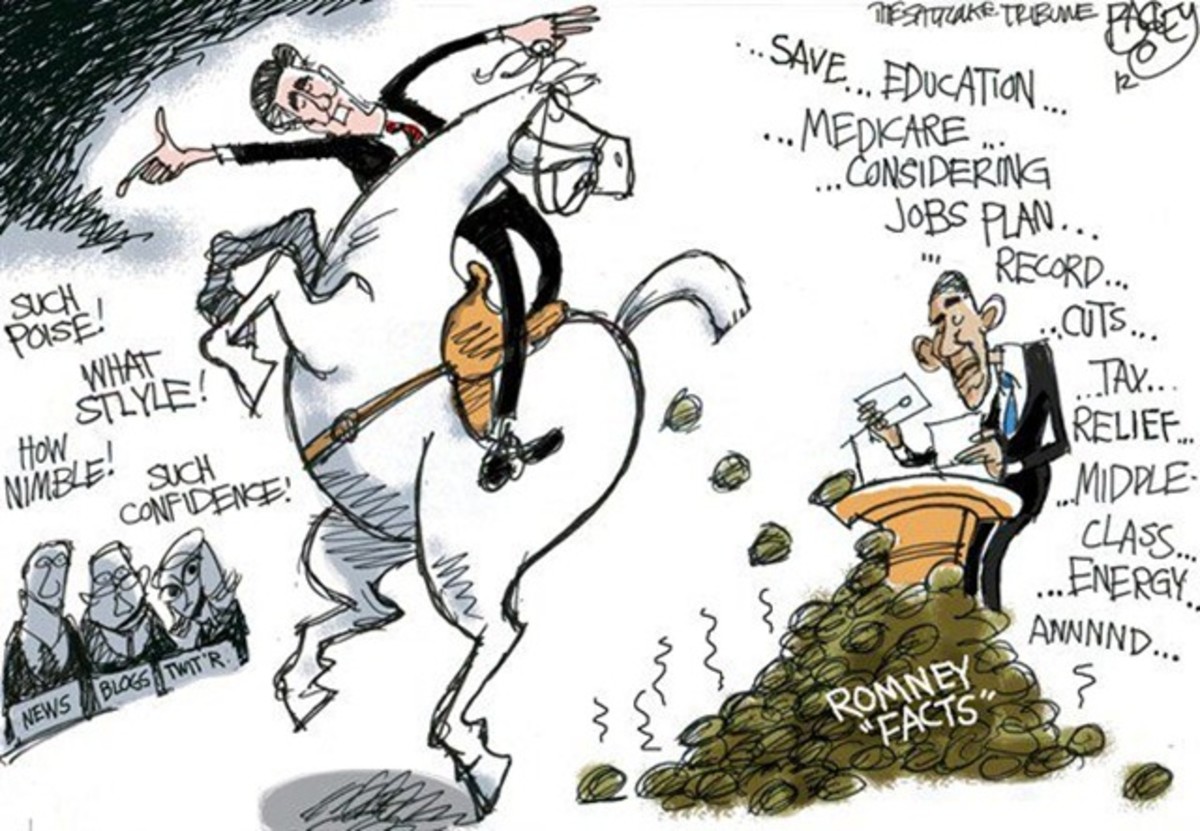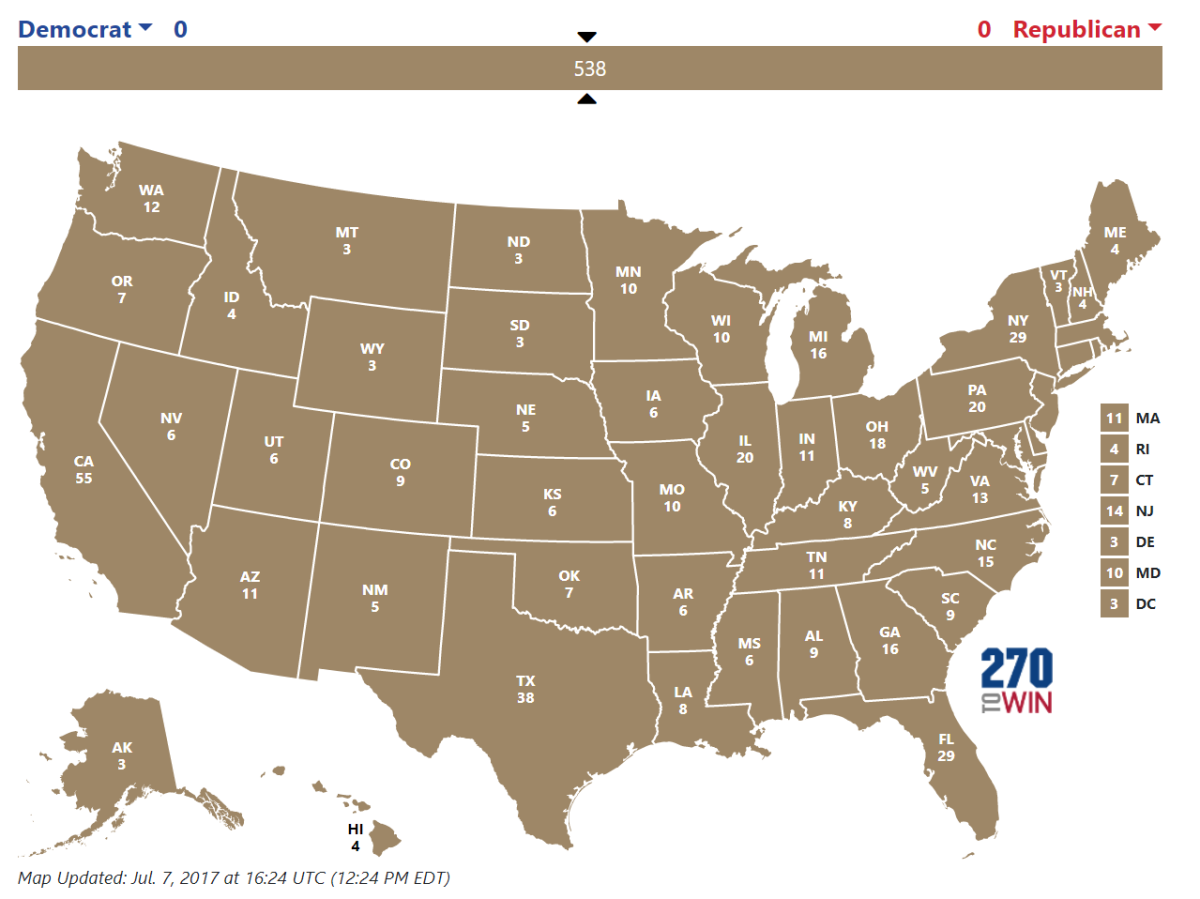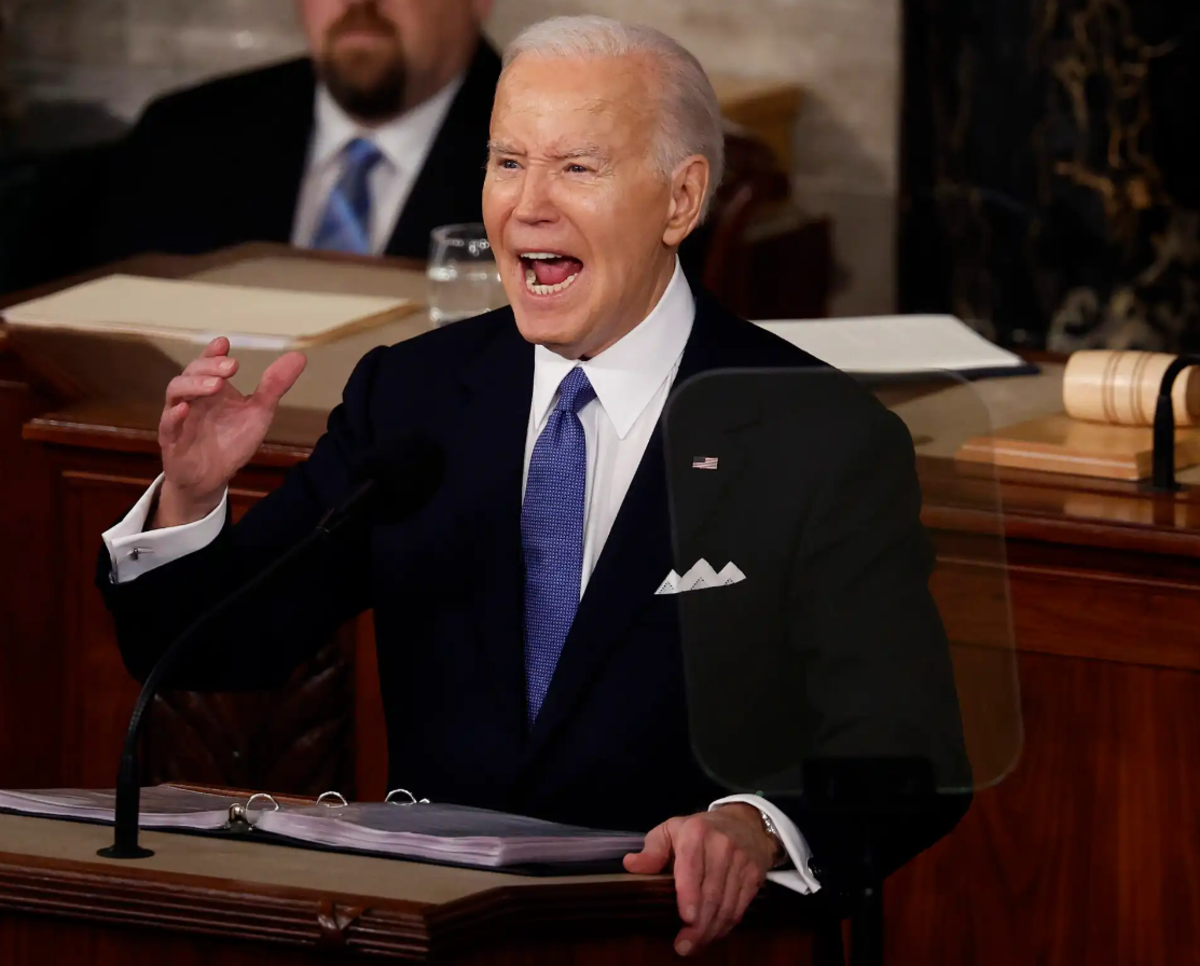A Response to Presidential Debate Number One: How do you Fight a Fantasy?

Will Anyone Ask for any Sacrifices?
In my last post, I said that I would quit writing about politics for a while. But after watching the first presidential debate, I just couldn’t help myself.
I anticipate this being a bit more of a rant than normal. This is partly just for the fun of it. When confronted with absurdity, finding humor in the situation can be healthier than banging your head against a wall. This is why I am so grateful for the existence of “The Daily Show” and “The Colbert Report.” Watching our so-called leaders being mocked mercilessly helps to keep me sane. These shows are a steady reminder that there is still some common sense in the world. (I do, however, promise to be more fair and balanced than either Fox News or MSNBC.)
The general consensus is that Mitt Romney won the first debate. In terms of his debating style and skill, along with the energy he displayed, I would agree with this assessment. He was continually on the attack, displayed excellent posture, and was willing to stare the President dead in the face as he pounced. My problem with Romney, however, is that I am a bit old-fashioned. I tend to be a sucker for actual substance. And when Romney was not distorting reality beyond all recognition, he spent much of the night saying, with both style and conviction, almost nothing at all. And when given the opportunity to put on full display his conservative convictions, he often came across sounding like the liberal on the stage.
But I am not going to bother going through the various ways that Romney distorted facts regarding President Obama’s record. Any readers who still care about facts can easily check out any of the non-partisan fact checking websites. Instead, I want to focus on what Romney said about his own plans. Because Mitt Romney, the man who had won the Republican nomination in the era of the Tea Party, apparently forgot what the word conservative is supposed to mean. First, he assured voters that he was not going to cut taxes. Sure, he would reduce tax rates on corporations and on middle-class Americans, but these would be offset by the reduction or elimination of various (unspecified) tax credits and deductions. He also assured Americans that he would not reduce taxes on wealthy Americans, likely much to the surprise of some his biggest campaign contributors.
He did, however, make it clear that he would not raise taxes. So surely, a fiscal conservative like himself would lay out some specific ways that government spending would be cut, starting with the largest sources of spending: entitlement programs. But when President Obama stated that Social Security only required some minor tweaks to keep it solvent, Romney did not contradict him. And instead of touting his plan for reducing Medicare costs, he attacked the President for (supposedly) pulling $716 billion out of the Medicare system, money that Romney promised to put back. He then promised that Medicare would not change for anyone currently over 60, and for future seniors currently under 60, he offered up some vague, Obamacare-like voucher system in which seniors would have a choice between traditional Medicare – you know, the public option – or private insurance companies that I am sure would bend over backwards to provide affordable premiums for old people. There is nothing insurance companies like more, after all, than insuring people who are likely to make claims. Meanwhile, Medicaid will be fixed by handing it completely over to the states. So in the world of Romneyland, no one would see any loss of benefits, and spending would go down through the magic of private enterprise and local government control. Our current system of private health insurance, after all, has done such a great job over the decades of keeping health care costs down.
It was remarkable to see this alternate universe that Romney had seemingly entered. When listening to a Republican scolding a Democrat for pulling funds out of Medicare, I felt that I had entered this strange new universe with him. But when the father of Romneycare, the Massachusetts health care reform plan that he pretended did not exist during the debates for the Republican nomination, began bragging about his signature achievement as governor, I knew that Romney had completely wiped clean the “etch-a-sketch” containing his previous ideas. This was the new, improved, moderate, former governor of Massachusetts Romney, a man who can balance a budget and solve social problems without asking for any measurable sacrifice of any kind. He will cut tax rates, eliminate deductions without pissing off any of the people and corporations who benefit from them, protect entitlement programs, and, like a good “conservative,” increase defense spending. Then, to top it all off, he will abolish the Obamacare plan (that was somehow different from his Massachusetts success story) and replace it with a better plan that keeps all of the benefits of Obamacare without any of the negative costs. And when his (not really) tax cuts and elimination of (unspecified) regulations cause our economy to grow like a flower in the spring, our problems will be wiped away.
It is a beautiful fantasy, and to the advantage of Romney, impossible to disprove completely. This is the great advantage of any challenger. At the moment, his presidency is completely theoretical, and he is not tied down to any previous policy statements. And when someone questions him on his numbers, he can assure us with a simple promise that his policies will neither blow up the deficit nor significantly cut government services: his policies will not have these negative effects because he says that they won't. So by definition, any criticism to the contrary is wrong. You can't argue with that logic, particularly since he has no record to the contrary.
President Obama, however, has a record, and as everyone knows, it is not a stellar one. The economy is still sputtering, and he has failed to bring down the deficit. And while he inherited a pretty lousy situation, excuses may not be enough to win elections. But when he stood up there on stage the other night, he did not look like a guy who was excited about defending his record. He acted like either a guy who was convinced that the election was in the bag, a college professor going through the motions, or someone who was still formulating plans for his wedding anniversary dinner.
But to be fair to the President, it is difficult to debate a guy who has a talent for changing policies at a moment's notice and is very "creative" in his use of "facts." If you attack his theoretical policies, he can change them up on you. If you hit him with inconvenient facts - which you can't help "embellishing" a bit - he is both armed with real statistics and "embellishments" that go much further than you are apparently willing to go. His criticisms, whether true or not, come across as much more damning than anything you can say. He is attacking your record; you are attacking his evolving ideas and the theoretical results.
President Obama, like all of his predecessors, has been confronted with the realities of the job. He has been faced with complex problems, and he has been forced to make choices between the various bad options. If he had decided to tackle the budget with significant tax hikes and/or spending cuts, the economy, which was in crisis when he entered office, would have likely suffered even more. If he focused more on economic stimulus, then the debt would explode. And given the debt he inherited on the day he took office, the stimulus could never be big enough to avoid significant economic pain, creating the impression that it failed. If he failed to tackle health care reform, the dysfunctional system would have kept sputtering along as it has for decades, draining resources from the government, businesses, and individuals. No matter what choices were made, certain negative consequences would result, and significant numbers of people, for various reasons, were going to disagree.
And as president, even when you have some good ideas that might alleviate problems, there are no guarantees that any of them will get through Congress intact (or at all). This is why, to a certain degree, much of the discussion in this first debate was irrelevant. These guys can propose all of the domestic policies that they want, but it will be difficult to get any of them through a deeply divided Congress. Promoting bipartisanship is easier said than done, especially these days.
But still, like Romney, the President had his chance to spell out specific steps that the government has to take to get its fiscal house in order and to protect important government services for future generations. Instead, he merely laid out a "balanced" approach of fairly limited tax increases and spending cuts. Like Romney, he clearly has little confidence in the willingness of the American people to make any significant, tangible sacrifices. Hopefully, if he wins reelection and no longer has a future campaign to worry about, he will grow some balls and tell us some hard truths. But for the moment, as it has for the last thirty years, the federal government continues to promote the fantasy that we can keep getting all of the government services that we are used to without actually paying for them.
So maybe this election doesn't make any difference. Assuming that the new Romney does not change his ideas next week, I did not see much on Wednesday night to distinguish these candidates from one another, with one significant exception. President Obama, whatever you think of his policies, has made some effort over the past four years to do what he said he would do: health care reform, financial regulation, economic stimulus, withdrawal from Iraq, stepped up efforts in Afghanistan/Pakistan, etc. You may think these are bad policies, but they are at least a reflection of his principles. Mitt Romney, on the other hand, has essentially been running for president for the last four years, and it is still difficult to determine if he has any fundamental, political principles. The only consistent principles he has displayed are the willingness to bend the truth and to change his ideas in order to achieve the desired political result. All politicians, to some extent, do the same thing. But Romney has taken political calculation to another level.
I have a pretty good sense of what President Obama will try to accomplish if he wins reelection. Romney, however, comes across to me as a dishonest wild card. And given both his background and the types of characters who have largely funded his campaign, I find it hard to believe that he will be asking either large corporations or wealthy Americans to make any significant sacrifices. So when it becomes clear that the fantasy he presented in the recent debate cannot be realized, which Romney will rise to the surface? I have a feeling that we will never find out, although this election, as the last debate demonstrated, is far from over.







